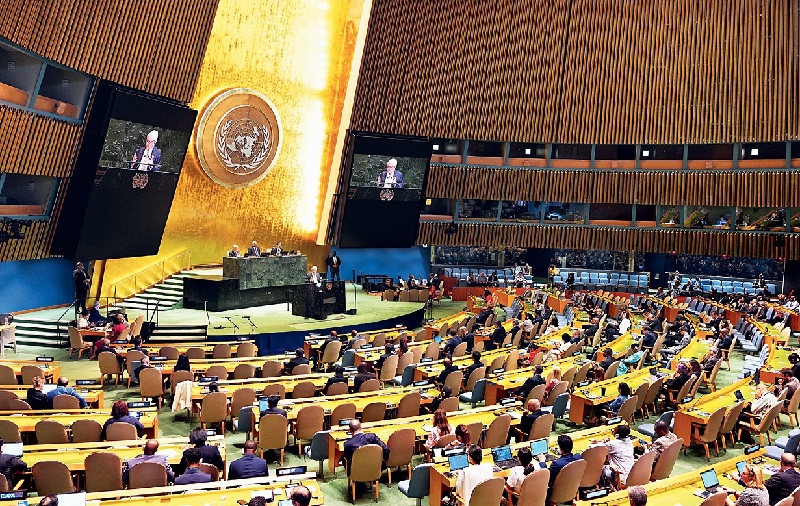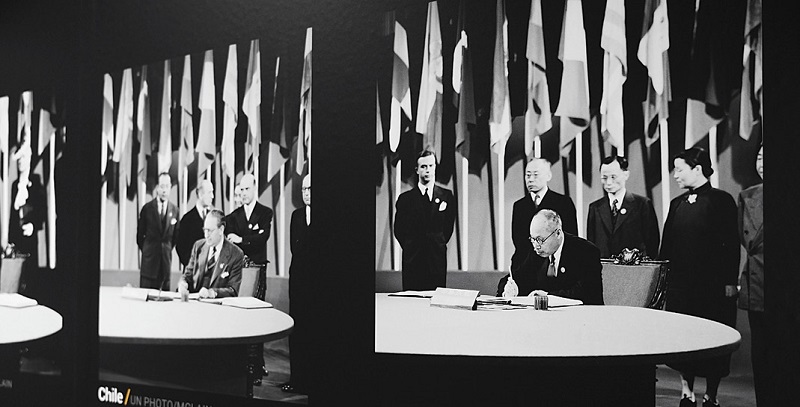As the UN marks its 80th anniversary, the U.S. weaponization of funding throttles the institution’s capacity to uphold multilateralism and imperils its very survival.

A commemorative meeting marking the 80th anniversary of the signing of the Charter of the United Nations is held at the UN Headquarters in New York on June 26, 2025.
The world should be celebrating the creation of the United Nations (UN) 80 years ago. However, its very existence is threatened.
China recognizes the UN as the core of the international system. The UN Charter is a legal treaty under which national governments freely agree to uphold values and principles of behaviour. As a manifestation of the principle of “the sovereign equality of members,” each has an equal vote in the General Assembly.
193 nations have chosen to become members and many have agreed to ratify other treaties drawn up under the auspices of the United Nations; for example, in respect of social and economic rights and climate change. As such, rules are agreed and laws established.
It is important not to confuse this legally based international system with the “rule-based world order” often promulgated by Western nations. No laws underpin the so-called “rule-based world order;” indeed John Dugard, a judge ad hoc at the International Court of Justice, recently concluded that it “threatens international law.” The rules are merely values that powerful countries presume to be universal and seek to impose on others without their consent.
Ironically, both the international system and the “world order” are being undermined by President Trump’s unilateral “America First” agenda. But, already underfunded, the UN is being held to ransom by the United States (U.S.) which is challenging its raison d’être.
The UN General Assembly is next best to a world parliament – a place where nations can talk meaningfully with each other about actions needing to be taken. The UN often speaks truth to governments that find truth unpalatable, typically when they are acting illegally. Sadly, though, the UN is often unable to act or to ensure that countries act as they should. As such, the United Nations is frequently reduced to being the world’s conscience. Even so, in a world beset by international thuggery, a conscience is necessary.
The UN’s inability to act is part accident, part deliberate. The accident was the death of U.S. President Franklin D. Roosevelt, 13 days before the de facto first meeting of the United Nations in San Francisco on April 25, 1945. Roosevelt believed in good governance; his administration’s New Deal policy had helped lift the U.S. economy out of depression and millions out of poverty. He similarly believed that international governance was possible and positive, creating a society of nation states with shared norms and aspirations.
His successor as president, Harry Truman, thought otherwise; a United Nations would reduce U.S. power and consequently its principal role must be limited to preventing another world war. Therefore, military security was prioritized over social and economic security. Ironically, though, the Truman administration was soon sidelining the UN’s peacekeeping role, confronting the “Soviet threat” by U.S. force rather than diplomacy.
The United Nations has achieved much during its 80 years and remains indispensable. UN Peacekeeping, to which China is a major contributor, has saved millions of lives. Promoting the cause of climate change, the UN has drawn attention to the greed of hydrocarbon corporations and their national backers that care little for the well-being of future generations. With belated success, it has begged the rich countries that first polluted the world partially to cover costs of loss and damage caused to developing nations.
Too often, though, the UN Security Council is made powerless, denied influence by vetoes used by permanent members. It has failed to demand a ceasefire in Gaza. Although a UN commission has called out war crimes in Gaza, no coordinated action has been taken. The United States has used its veto on more than 50 occasions in the support of Israel, at least five times since the current war started.
On June 20, 2025, the Security Council could do no more than listen to Israeli delegates saying that Israel would not stop bombing Iran, an act of aggression that precluded the outcome of negotiations being held in Geneva. This was hours before the United States, in concert with Israel, bombed alleged nuclear facilities deep in Iran, action that “greatly alarmed” the UN Secretary-General António Guterres who described it as “dangerous escalation in a region already on the edge.”

The exhibition “Reviving the San Francisco Spirit,” which is aimed at commemorating the 80th anniversary of the signing of the Charter of the United Nations, opens at the UN Headquarters in New York on June 26, 2025. The picture shows a historical photograph (right) of China’s representative Dong Biwu signing the Charter.
The original vision of the United Nations, drawn up at Dumbarton Oaks (near Washington, D.C.) in August 1944, did not include vetoes that have so weakened the moral authority of the Security Council. Moreover, it envisaged that powerful economic organizations such as the World Bank, International Monetary Fund, and the World Trade Organization would be part of the UN. That way they would be responsible to the General Assembly rather than being controlled by the United States and European governments.
Old wisdom offers new insights. The General Assembly and its committees – the venue where all national voices are accorded equal weight – must be afforded more power and influence. By analogy with nation states, they should have the right directly to make international law, and to implement it through the UN Secretariat as interpreted by international courts. The distinguished international economist Augusto López-Claros, among others, has argued that the General Assembly, now peopled by national diplomats, deserves a membership of nationally elected representatives.
The UN Security Council is an historic relic replicating colonial power structures. By analogy, it is the world’s executive and should accurately reflect present day realities. Nations that did not yet exist in 1945 are now centers of global influence and deserve true recognition. The veto principle should be abolished or its significance much reduced.
However, for the UN to be reformed such that, in the language of China’s 2023 foreign policy white paper, “international rules will be written by all, …global affairs … governed by all, and … the fruits of development … shared by all,” it needs to survive. While the entire UN budget is little more than half that of the U.S. state of Delaware, Member States had contributed only 49 percent of its annual regular budget by May 9, 2025.
Whereas 152 nations (China included) were fully paid-up members at the end of 2024, the U.S. – the largest funder on account of the size of its economy – was in deficit. Now, with the U.S. deliberately withholding US $1.5 billion to force cuts in what it sees “as unnecessary spending,” the UN admits that lifesaving programs are under threat.
It is important to register that the spending which the U.S. considers “unnecessary” coincides with the UN’s core activities including the World Health Organization and the UN Framework Convention on Climate Change. Even more important, the Trump administration has announced its opposition to the Sustainable Development Goals (SDGs). Agreed by all 193 UN members in 2015 – thereby including the United States – 17 goals encouraged global improvements in poverty, health, education and human well-being.
Whereas the U.S. Biden administration ignored the SDGs, failing to join the 190 governments that have submitted their national SDG programs to international scrutiny, the Trump administration “rejects and denounces” the SDGs and the associated 2030 Agenda for Sustainable Development.
The United States is therefore standing against the rest of the world’s people claiming that the SDGs are “inconsistent with U.S. sovereignty and adverse to the rights and interests of Americans.” It is employing its economic might to inflict its views on others.
While it might seem fair that the UN is financed by Members’ contributions fixed according to their ability to pay, the U.S. is exploiting this system and coercing all other nations. A new means of financing the UN must be found.
There is good cause to celebrate the 80th anniversary of the founding of the UN that has supported multilateralism and the shared interests of the community of nations. It is the principal institution that prevents international relations becoming a Darwinian jungle where weak nations are eaten up by strong ones. U.S. “realist” and “neorealist” policy scientists argue that a jungle is less a metaphor, more a reality, even a desirable one.
The world in the 1910s as well as the 1930s and 40s was accurately characterized as a geopolitical jungle and resulted in over 50 million deaths in two world wars. In 1945, it was agreed that this was a price too high to pay for unilateralism or one nation’s bid for primacy or hegemony.
The correct decision then, it is surely the right decision now. However, the UN must be empowered to ensure that the rule of the jungle does not prevail. 
ROBERT WALKER is professor emeritus and emeritus fellow of Green Templeton College, University of Oxford. He is a professor at the Jingshi Academy of Beijing Normal University and also a fellow of the Royal Society of Arts and the Academy of Social Sciences in the U.K.